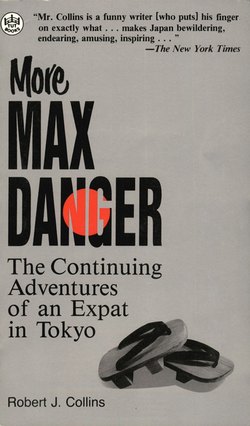Читать книгу More Max Danger - Robert J . Collins - Страница 10
На сайте Литреса книга снята с продажи.
ОглавлениеThe Columnist
"GOOD GOLLY ," exclaimed Max's companion as they stepped from the cool darkness of the LaForet Museum into the warm sunlight of a Tokyo autumn afternoon. Max's companion was ecstatic.
"That exhibition of late Edo calligraphy—particularly the demonstrated influence of badger-hair brushes on the evolution of stroke modification—was especially stimulating," continued the companion. He was rocking from toe to heel in excitement.
"Yes, it certainly was interesting," confirmed Max. "Let's get a drink."
"Well, I suppose we do have time for tea and cakes before the first act at the Kabuki Theater," said Max's companion. "But we don't want to miss the thrilling drum/samisen/ shakuhachi overture."
"Plus the clanging things," added Max.
"Particularly the clanging things," stated his companion.
The two gentlemen settled themselves in a cozy little teahouse staffed by ladies in black dresses with white aprons. The aprons served the purpose of distinguishing the waitresses from the middle-aged clientele.
"Do try the éclairs here," said Max's companion, "they're scrumptious." They, assuming one likes those things, were.
"And now," said the companion, wiping a globlet of whipped cream from the tip of his nose, "there's something I'd like to seriously discuss."
Max sat back in his chair. His companion took the napkin from under his chin and re-folded it along the original creases. He laid it carefully next to the oshibori (hot towel), which had earlier been rerolled and inserted into its torn plastic bag. A kindly waitress came by and refilled his cup of tea.
"I would like you to consider," said Max's companion, between tiny sips of tea, "writing a column on expat life for my weekly newspaper."
"What?"
"I would like you to consider ..."
"I heard what you said, but I've only been in Japan a short time," said Max.
"The clearer your eye will be for details," rejoined the famous Tokyo editor/publisher.
"But I'm not out and around much," said Max. "I'm always working."
"The more objective you'll be," rejoined the famous editor/publisher.
"All my spare time, what little there is, goes to my wife and children," said Max.
"The more wholesome your opinions for my readership," rejoined the famous editor/publisher.
"I can't write," said Max.
Someone dropped a tray of teacups and saucers in the rear of the restaurant.
"That could be a problem," the famous editor/publisher admitted after a minute or so. He had been making little mountains of sugar on the table and shaping them with his thumb and index finger.
"But," he continued, "if you submit the stories, I'll critique them for quality and then you'll rewrite them."
Max watched his companion playing with the sugar. By dipping his fingers in the tea, he was able to sprinkle little droplets of liquid on the white mountains. Instant erosion, with lakes and rivers.
"So it's a deal then?" asked the famous editor/publisher. He covered the table with his palms as the waitress brought the check.
"It's a deal," confirmed Max, giddy from the éclairs.
They shook hands, and Max spent the rest of the day at Kabuki licking his fingers.
It was a dark and stormy night when Jack Armstrong, President of the American Chamber of Commerce in Japan, savagely murdered his Executive Director and took off for Brazil with the Chamber funds. . . .
"Ah, actually you might want to be a little less specific when writing about existing institutions," suggested the famous editor/publisher after Max had submitted his first manuscript. "You don't want to write too close to home."
It was a dark and stormy night when General Mayhem sent the combined U.S. air, naval, and ground forces on maneuvers in Shimoda without first informing Japan's Self Defense Forces. . . .
"I know you've never been to Yokota, Yokosuka, or Shimoda, but that's not what I meant by not writing 'close to home,' " counseled the famous editor/publisher. "Besides, subtlety plays a role in good writing."
It was a dark and stormy night when Biff Straight, President of the Tokyo American Club, announced that members violating any rules at the Club would be lined up at the edge of the uncovered pool and summarily executed. . . .
"That's better," agreed the famous editor/publisher, "but just a little too dramatic. Think about what you do at work."
It was a dark and stormy night . . .
"Doesn't anything happen to you in the goddam daytime?" queried the famous editor/publisher.
It was a cold and grey afternoon when Bart Holstein, CEO of a major international conglomerate and my boss' boss' boss, arrived in Tokyo and began to chew ass. . . .
"You know Max," advised the famous editor/publisher, "I had in mind something a little different. For your own safety, if nothing else, write about commonplace things."
The day they discovered poisoned meat at National Azabu Supermarket, . . . "
Could we get together again, Max, and discuss this project?" suggested you-know-who. "I'm interested in reevaluating our editorial thrust."
It was during this second meeting of editor/publisher and prospective writer—a meeting held at the very same teahouse near the LaForet Museum—that the idea struck both men. Such a clever idea it was too, both men agreed. The project began at once.
Since that red-letter day the foreign community in Japan has had the benefit of the type of wisdom readily available in the syndicated newspaper columns and journals back home. A real community service was born in the personification of politeness itself. The beloved Mr. Etiquette made the first of many regular and helpful appearances. And what would we all do without him?
